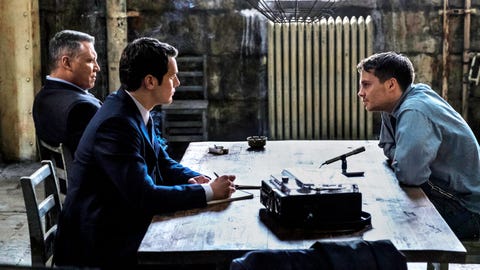
Mindhunter
is an American crime drama series, and it is loosely adapted off of the non-fiction
book Mindhunter:
Inside the FBI's Elite Serial Crime Unit by John Douglas and
Marl Olshaker. The two major characters in the show Holden Ford and Bill Tench
are based off on real life FBI agents John E. Douglas and Robert K. Ressler
respectively who are considered to be the first to establish the field of criminal profiling,
and have even been credited with coining the term “serial killer” (though this
has been disputed by some)
The
series is set in 1977, a time where the FBI’s understanding and use of criminal
psychology was almost non-existent, and deals with the protagonists first foray
into this field. There is a new spate of crime that the FBI do not understand,
murders that seemingly are committed without any comprehendible motive, a
murder committed by a stranger to the victim.
The show
starts with the scene of a terribly mismanaged hostage situation, rife with
threats and guns aimed at the person holding some civilians hostage. It is
clear in a matter of a few seconds that the criminal is in the midst of some
serious mental health issues, he is confused and appears to have delusions, and
does not happen to have any real intent to use the gun he is holding to attack
anyone. Holden tries to deescalate the situation, which ends in the criminal
committing suicide with the gun he is holding. The hostage situation is deemed
a success and Holden is asked to teach. It quickly becomes apparent to the viewers,
and later to Holden himself, that though he considered the operation a failure
as the negotiation had to end in the death of the criminal, the FBI considered
it a success due to the lack of civilian deaths.
As Holden
teaches, he realises that everybody is, in fact completely uninterested. The
FBI trainees do not understand the importance of learning to talk to the
perpetrators in hostage situations. They were much more willing to shoot them
instead. To Holden all the firearm training they are receiving is meant to be a
last resort. He appeals to them in class when he says “Just listen. Listen to
what he has to say. Try to understand him instead of trying to dominate him.
Look for common ground. Our goal is no body bags. That is the hostage-negotiater
win-win”. He emphasises the importance of understanding the criminal,
understanding where he comes from, what makes him act the way he does, all of
which completely goes over the head of everybody he is talking to.
Holden
soon starts talking to various criminals who are behind bars for extremely
violent crimes, convicts he calls ‘sequence killers’. The show’s main focal
point is the fact that Holden does not believe that these people were born with
criminality preprogramed within them, but that their experiences and the
environment in which they grew up in contributed to the gruesome acts they
carried out. Holden believes that aiming to understand what experiences
contributed to their violent outbursts would be the key to catching future
criminals and preventing further crimes of this nature. For example, while interviewing
his first ‘sequence killer’ Ed Kemper, Kemper reveals to him that a major
reason for his violence against women was the constant humiliation as well as
the physical and emotional abuse he faced throughout his life at the hands of
his mother. Holden soon realises that traits like this were common in most of
those he interviewed later. He identified certain common characteristics among
serial killers, like the fact that most of them came from terribly
dysfunctional families, that they committed acts that were considered sadistic
during childhood- like torturing small animals, and had habits like setting
fires. He used the information that he now has to create profiling techniques.
The profiling techniques subsequently help in catching serial killers.
The true
essence of the show lies here. The show emphasises the importance of talking
to, and of understanding the criminal you have incarcerated. Most crime dramas
are aimed at catching the criminal, but Mindhunter is aimed at understanding
what makes criminals act the way do. The idea of talking to a person who is dangerously
‘crazy’, and who is ‘crazy’ beyond reformation is difficult to comprehend, and
justifiably so. Many serial killers rape and torture their victims, and trying
to understand why they do these things seems simply absurd to many. But the
motive of conversing to them should not be to have them justify their acts, but
to glean information from them. The knowledge one gets from talking to criminals
helps catch further criminals, and could at one point prevent a crime from occurring
in the first place. The knowledge could help rehabilitate potential criminals, and
never let them reach a point where they commit a crime. Mindhunter reiterates the
value of going one step further, going a step further than reducing violence by
putting a dangerous criminal behind bars, and that is to use a criminal’s
experiences to prevent further violence. At one point Bill Tench says the
following words, which sums up the crux of the show and this blog post:
“How do
you get ahead of crazy if you don’t know how crazy thinks?”
*This is not to say that there
aren’t certain problems with Mindhunter. If one is unaware of the almost insignificant
relationship between violence and mental illness, the show might suggest that
there is a strong correlation between the two. This is not the case in reality.
The show also does not use sensitive language when it comes to talking of those
with mental illness. There is the constant use of the word ‘crazy’, however
this could have simply been done to preserve the accuracy (and ignorance) of
the time.
References:
Fincher, D.(Director). (October 13, 2017). Mindhunter
[Netflix series].
Comments
Post a Comment